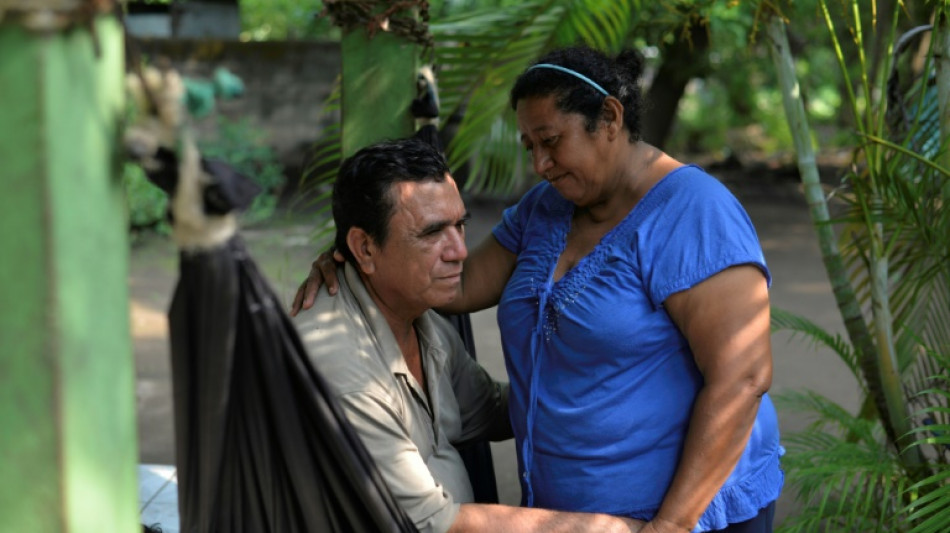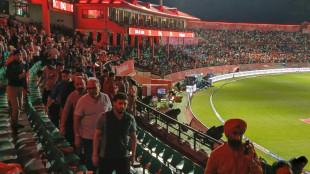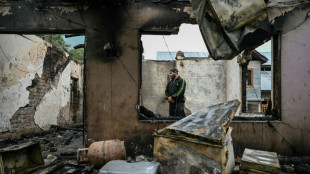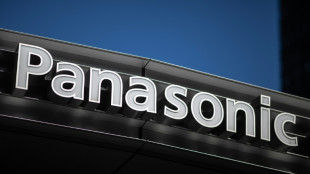
-
 Liverpool boss Slot fears replacing Alexander-Arnold will be a tough task
Liverpool boss Slot fears replacing Alexander-Arnold will be a tough task
-
British Airways owner unveils big Boeing, Airbus order

-
 IPL suspended for one week over India-Pakistan conflict
IPL suspended for one week over India-Pakistan conflict
-
Slot says all at Liverpool sad to see Alexander-Arnold go

-
 Leo XIV celebrates first mass as pope in Sistine Chapel
Leo XIV celebrates first mass as pope in Sistine Chapel
-
India says repulsed fresh Pakistan attacks as death toll climbs

-
 Japan's Panasonic targets 10,000 job cuts worldwide
Japan's Panasonic targets 10,000 job cuts worldwide
-
Putin evokes WWII victory to rally Russia behind Ukraine offensive

-
 China exports beat forecasts ahead of US tariff talks
China exports beat forecasts ahead of US tariff talks
-
Leo XIV, the 'Latin Yankee', to celebrate first mass as pope

-
 Most stocks lifted by hopes for US-China talks after UK deal
Most stocks lifted by hopes for US-China talks after UK deal
-
IPL suspended indefinitely over India-Pakistan conflict: reports

-
 German lender Commerzbank's profits jump as it fends off UniCredit
German lender Commerzbank's profits jump as it fends off UniCredit
-
Rare bone-eroding disease ruining lives in Kenya's poorest county

-
 India says repulsed fresh Pakistan attacks as de-escalation efforts grow
India says repulsed fresh Pakistan attacks as de-escalation efforts grow
-
Zhao's historic snooker title sparks talk of China world domination

-
 'High expectations': EU looks to Merz for boost in tough times
'High expectations': EU looks to Merz for boost in tough times
-
Poisoned guests rarely invited before deadly mushroom lunch, Australia trial hears

-
 China sales to US slump even as exports beat forecasts
China sales to US slump even as exports beat forecasts
-
Indian cricket to make 'final decision' on IPL over Pakistan conflict

-
 Dethroned Bundesliga champions Leverkusen face uncertain future
Dethroned Bundesliga champions Leverkusen face uncertain future
-
China can play hardball at looming trade talks with US: analysts

-
 French monuments in trouble while PSG prepare for Champions League final
French monuments in trouble while PSG prepare for Champions League final
-
Newcastle face Chelsea in top five showdown, Alexander-Arnold in spotlight

-
 Flick's Barca must show 'hunger' in crunch Liga Clasico
Flick's Barca must show 'hunger' in crunch Liga Clasico
-
Clasico the last chance saloon for Ancelotti's Real Madrid

-
 Timberwolves overpower Warriors to level series
Timberwolves overpower Warriors to level series
-
Chinese fabric exporters anxious for US trade patch-up

-
 Putin gears up to host world leaders at lavish army parade
Putin gears up to host world leaders at lavish army parade
-
Nearing 100, Malaysian ex-PM Mahathir blasts 'old world' Trump

-
 Leo XIV, first US pope, to celebrate first mass as pontiff
Leo XIV, first US pope, to celebrate first mass as pontiff
-
Asian stocks lifted by hopes for US-China talks after UK deal

-
 Former head of crypto platform Celsius sentenced 12 years
Former head of crypto platform Celsius sentenced 12 years
-
Ex-model testifies in NY court that Weinstein assaulted her at 16

-
 Amphastar Pharmaceuticals to Present at the 2025 Bank of America Health Care Conference
Amphastar Pharmaceuticals to Present at the 2025 Bank of America Health Care Conference
-
Ascendant Resources Announces Closing of Second and Final Tranche of Non-Brokered Private Placement

-
 Nestlé and OMP Showcase Approach to Future-Ready Supply Chain at Gartner Supply Chain Symposium/Xpo in Barcelona
Nestlé and OMP Showcase Approach to Future-Ready Supply Chain at Gartner Supply Chain Symposium/Xpo in Barcelona
-
Genflow Biosciences PLC Announces Share Subscription, Director's Dealing and Update

-
 Argo Blockchain PLC Announces 2024 Annual Results and Restoration of Listing
Argo Blockchain PLC Announces 2024 Annual Results and Restoration of Listing
-
'Great honor': world leaders welcome first US pope

-
 Pacquiao to un-retire and fight Barrios for welterweight title: report
Pacquiao to un-retire and fight Barrios for welterweight title: report
-
Trump unveils UK trade deal, first since tariff blitz

-
 Man Utd one step away from Europa League glory despite horror season
Man Utd one step away from Europa League glory despite horror season
-
Jeeno shines on greens to grab LPGA lead at Liberty National

-
 Mitchell fires PGA career-low 61 to grab Truist lead
Mitchell fires PGA career-low 61 to grab Truist lead
-
AI tool uses selfies to predict biological age and cancer survival

-
 Extremely online new pope unafraid to talk politics
Extremely online new pope unafraid to talk politics
-
Postecoglou hits back as Spurs reach Europa League final

-
 Chelsea ease into Conference League final against Betis
Chelsea ease into Conference League final against Betis
-
Pope Leo XIV: Soft-spoken American spent decades amid poor in Peru


Nicaraguan plantation workers 'poisoned' by pesticides fight for justice
Hundreds of Nicaraguan plantation workers left sick or sterile after working with a noxious pesticide in the 1970s were dealt a blow this week when a French court ruled against their claims for compensation.
For nearly five decades, survivors have been fighting to be given compensation by the multinational firms Nicaraguan courts have held responsible for the malpractice.
In the municipality of Tonala -- a paradise turned hell for plantation workers in northwestern Nicaragua -- barrels that once contained the pesticide known as Nemagon or Fumazon still stand, rusting.
At one point, they were repurposed as water tanks.
"There were four plantations in Tonala, with up to 4,000 workers each," 60-year-old farmer Luis Gomez reminisced of the area's golden years from the late 1960s to the early 1980s.
"It was where they paid best, they had hostels for employees and bananas were shipped every three or four days."
His wife, Idalia Paz, 55, shared in the nostalgia, remembering how "people came from all over."
For his work there as a youngster, however, Gomez was diagnosed years later with infertility.
"That joy ended in the sadness of not having children," said Paz, through tears.
- 'Had we known' -
Gomez and Paz are among 1,200 farm workers who had their claim against three multinational chemical giants rejected by a French court on Wednesday.
In 2006, a Nicaraguan court had ordered Shell, Dow Chemical and Occidental Chemical -- which had marketed the pesticide in Central America -- to pay $805 million in damages to workers.
The ruling was upheld on appeal in 2013.
But the money never came, and many of the victims have since died.
The US-based multinationals withdrew their assets from Nicaragua, according to the plaintiffs' lawyers, and insisted Nicaraguan courts lacked jurisdiction.
In 2018, the plaintiffs took their case to France under a law there that allows enforcement of a foreign court order in France. Under such an arrangement, the courts there could have seized some of the three companies' European assets, and used them to compensate the workers.
But French judges, too, found that Nicaraguan courts did not have jurisdiction in the case as the defendants had sought a trial on US soil under a Nicaraguan law that allows this.
DBCP, the active ingredient in Nemagon, was banned in the late 1970s in the United States after it was found to cause sterility in male workers, but continued to be used on plantations in other countries.
It has been the subject of numerous lawsuits in Latin America.
Tonala, a rural community with only about 600 inhabitants in the early 1970s, suddenly boomed as its plantations expanded, in large part thanks to Nemagon.
"If we had known there was a danger we would have been more careful," said Pedro Regalado, 74, who worked on a plantation called El Paraiso, which translates as "The Paradise".
"But we did not know, and later we found out that this product was harmful."
In addition to being infertile, Regalado also suffers from other health ailments.
"If I am alive it is because God is great," he told AFP.
- Disappointed, again -
Hopeful farmers waited by the phone Wednesday for the French court's verdict, discussing how the money would allow them better access to medical treatment.
But the downbeat tone of their lawyer Barnard Zavala on the line soon shattered any thoughts of victory.
"They denied our claim because the judges had no jurisdiction over the companies," Zavala explained to the group after being briefed from Paris.
"We were disappointed," said Paz. "We were expecting a ruling in favor of the sick."
She expressed incredulity at the finding of non-jurisdiction.
"It was here where it was used, it was here that we were affected, in Nicaragua," Paz insisted.
The plaintiffs said they would appeal.
- 'It was a crime' -
"When I was told that I was 100 percent infertile, that I was damaged and I was never going to have children, I felt a deep disappointment," said Pedro Fletes, 57, another Nemagon victim.
His father took him to work on the banana plantations when he was just 10 years old.
"Sometimes we are rejected by society itself. I have been through very hard times when they tell me: 'You didn't amount to anything in this world, you didn't procreate,'" he told AFP, wiping away tears with the back of his hand.
Fletes, who also battles other health conditions, lives with his third partner.
The others left him, he said, because he was unable to have children.
"I think it was more than unjust, it was a crime," what the multinationals did in Nicaragua, Fletes said.
No compensation, he added, can ever make up for the harm he had suffered.
"The damage is done. It is irreparable."
M.A.Colin--AMWN